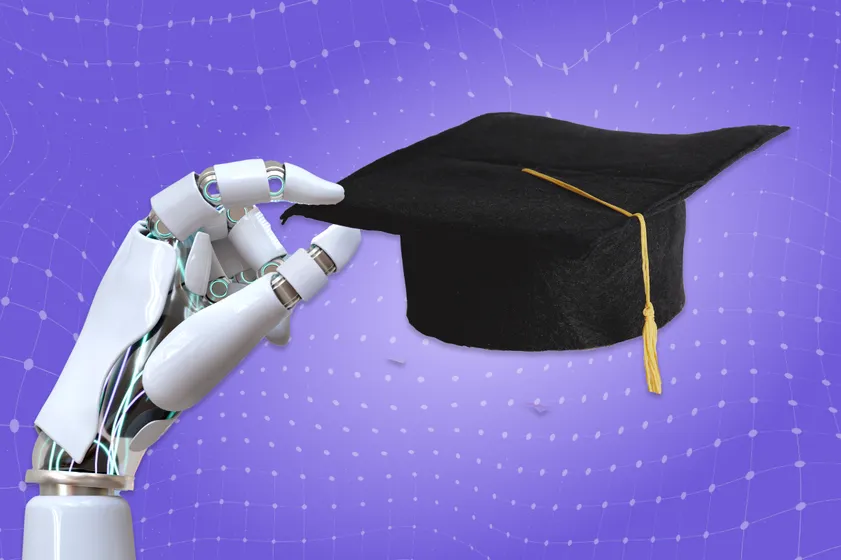Kazakhstan is embarking on a new chapter in education, artificial intelligence, and science. This step signifies the nation's commitment to staying at the forefront of technological advancements, as it integrates cutting-edge AI technologies into the academic landscape of its universities. The aim is not only to nurture a new generation of professionals proficient in AI but also to revolutionize the traditional educational paradigms, ushering in an era of innovation and scientific progress.
QazMonitor presents an in-depth review of Kazakhstan's educational and technological transformation, the introduction of AI courses in universities starting in 2024, and various initiatives to advance AI and science in the country.
Kazakhstan to offer AI courses in all universities starting in 2024
The Nobel Fest, which took place in Astana on October 5-6, shed light on these exciting developments. At the forum, President Kassym-Jomart Tokayev stressed the importance of modernizing teaching methods across educational institutions. He pointed out that future educators, medical professionals, agronomists, lawyers, and industry specialists must possess fundamental knowledge in the realm of artificial intelligence.
The Minister of Science and Higher Education, Sayasat Nurbek, emphasized the transformative role of companies like OpenAI, the creators of Chat GPT technology, in revolutionizing the world of information technology. He announced that commencing in 2024, every university across Kazakhstan will introduce artificial intelligence courses.
"In collaboration with Google, we have initiated a pilot AI course in 14 Kazakh universities. If this course proves successful, we will introduce AI literacy courses in all universities across Kazakhstan from the next academic year," stated Sayasat Nurbek.

Furthermore, Kazakhstan's scientific sector is currently undergoing a sweeping transformation, with a draft law slated for discussion in the Majilis, the lower house of Kazakhstan’s Parliament. This legislation marks a shift to an open model, where universities will bear the primary responsibility for driving innovation and scientific progress.
Significantly, the government has allocated 650 billion tenge for the development of science in Kazakhstan this year, marking a threefold increase in funding for the first time in 30 years.
Entrepreneur and philanthropist Islambek Salzhanov pointed out the unique historical opportunity that Kazakhstan has today during these technological transformations.
Kazakhstan should take the lead in propelling global technological advancements. Much like the third industrial revolution propelled the Asian Tigers into becoming global innovation leaders, today's Kazakhstan has a similar chance to make a technological leap, showcasing the talents and capabilities of its young scientists and innovators. This is an era of revolution, where historical experience is not a prerequisite for pioneering new technologies, as these innovations are new to the entire world.
Dariya Kozhamzharova, the Provost of Auezov University, also emphasized the urgency for Kazakhstan to embrace modern developments and technologies, recognizing that traditional education is falling behind the requirements of the modern world.
Measures of implementation of AI in universities
Numerous higher education institutions across Kazakhstan have already begun integrating artificial intelligence into various areas, effectively revolutionizing their operational processes. Administrative procedures are becoming more streamlined and efficient, thanks to AI's automation capabilities, while student assessment methods are evolving to be more data-driven and personalized. Additionally, research endeavors are witnessing a transformation, with AI aiding in data analysis and pattern recognition, expediting the pace of discovery.
Prominent universities like Al-Farabi Kazakh National University (KAZNU), L.N. Gumilyov Eurasian National University (ENU), and Suleyman Demirel University (SDU) have taken proactive steps in offering specialized programs and courses in artificial intelligence. These educational initiatives are designed to equip the next generation of professionals with the knowledge and skills necessary to thrive in the AI-driven world.

One of the exciting developments on the horizon is the establishment of the School of Artificial Intelligence and Informatics at Korkyt Ata Kyzylorda State University, in collaboration with SeoulTech. This institution, slated to commence operations in the coming month, has a clear mission: to train a new wave of experts proficient in artificial intelligence, cybersecurity, and informatics. The initiative, titled the Leading University Project for International Cooperation (LUPIC), secures funding from the National Research Fund of the Republic of Korea and the Ministry of Education of the Republic of Korea, with support from the Ministry of Science and Higher Education of Kazakhstan. This project is poised to reshape the educational landscape, ensuring a steady supply of AI-savvy professionals to meet the growing demands of the industry and academia.
Next month, Satbayev University and the City University of Hong Kong plan to sign an agreement to establish a school of artificial intelligence as well.
Another significant initiative involves Nazarbayev University's plans to establish a full-fledged research institute, which was announced by President Tokayev at the Digital Bridge forum. This institute will specialize in in-depth research and development in artificial intelligence.
The transformation of the Institute of Smart Systems and Artificial Intelligence at Nazarbayev University into a comprehensive research institute is another significant step. The institute's goal is to create a holistic ecosystem, attracting the industry's best specialists and experts. It will house a research and development center that operates in close partnership with global and domestic IT industry leaders.
Kazakhstan is embarking on a remarkable journey towards becoming a global hub for knowledge, innovation, and scientific excellence. Through partnerships with global leaders in technology and research, the synergy between academia and industry is expected to accelerate innovation, bolstering Kazakhstan's position on the global technological stage.










